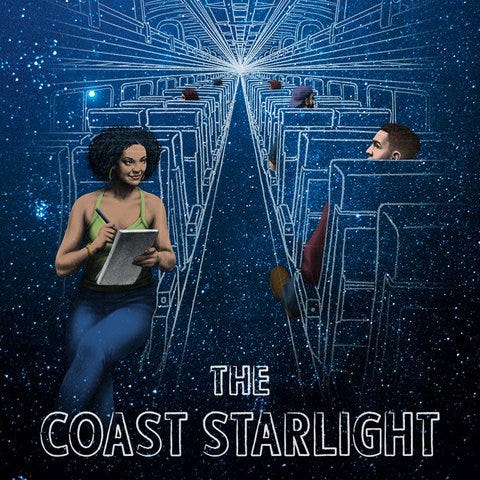'THE COAST STARLIGHT:' A TRIP TO PAST PERFECT
The Coast Starlight took me by surprise. It’s rather amazing to encounter a play written from a perspective you’ve never previously seen on a stage, delivered in a dramatic tense you’ve never previously heard. I’m not talking avant garde. I’m not even suggesting revolutionary. I’m just saying unexpectedly different.
The setup seems familiar, the structure, predictable. We’re onboard a railroad car on Amtrak’s Coast Starlight line, embarking from Los Angeles for the long ride to Seattle. The passengers will enter one-by-one and grab seats, you can bet on that. And we’re going to get know them, and their secrets. Count on that too.
A young lady and a young man occupy different seats. Strangers on a train. They begin to speak at, but also around, each other. To us. Travelers breaking the fourth wall to tell the audience their inner thoughts about where they’re headed. Nothing radical in that either. Still totally familiar terrain.
But then the guy, TJ, announces, about the girl, Jane: “I wanted to lean across the aisle and say to her: I have no idea where I'm headed today - I just decided I'd get on a train and head north.” And Jane, responds: “If he'd told me that, I'm not sure what I would've said.”
I don’t believe I’ve ever seen a play voiced entirely with what characters wished they’d said to each other. That’s the distance The Coast Starlight traverses. It is a play constructed entirely in ‘what-ifs’ — conversations that were never spoken. It is a voluble play about abject silence. And solitude.
Four more straggling strangers take seats on this train car, each unremarkable, all about the same age, 40-ish. They open up almost instantly about themselves, to us, and to each other, in conversations that never were consummated: Noah, a bit grungy, an ex-GI; Liz, a bit blowsy, on her phone over-sharing loudly an intensely embittered boyfriend rant; Ed, a worn-down traveling salesman; and, finally, Anna, well-to-do, a mom with a wife and sons at home, returning from burying her beloved brother.
TJ, of course, has a secret. The entire train car of characters, by the end, has an opinion about what he should do about it. Everyone has come to care about him and his shadowed future. Yet, none of them, in fact, will ever know anything about him or each other because they never actually spoke.
The disconnect is poignantly disorienting and the cast, superb: Will Harrison as TJ, Camila Canó-Flaviá, Rhys Coiro, Mia Barron, Jon Norman Schneider and Michelle Wilson. They fiercely bring to life this motley array of creatures any train car might hold, handing us their lives in outbursts of dialogue, projecting back to their origin stories and life-altering mistakes but also forward into futures that might have been; together, even, with one or another, in some cases, if only any of them had just said something.
The Coast Starlight itself might have easily been a mess in the past perfect tense. Instead I found it eerily exhilarating and, increasingly, heart-breaking. It helps that the play is transparently well-written, by Keith Bunin, that it has been staged with rigor and ingenuity by Tyne Rafaeli, that Lincoln Center Theater has given it a noble production, with engulfing projections by Ben Pearcy of 50 Productions and a set, by Arnulfo Maldonado, that is conjuringly ingenious — a constant revolve of reconfiguring train rows that delivers the passengers to us and away from us, and each other, as their unspoken thoughts are spoken, not merely in interior monologues but in fiery exchanges that reveal just about everything and trigger attractions, rejections, and even love, that never was or will be. But could have been.
That’s life. We speak so little of what we have to say. And then we’re gone.




